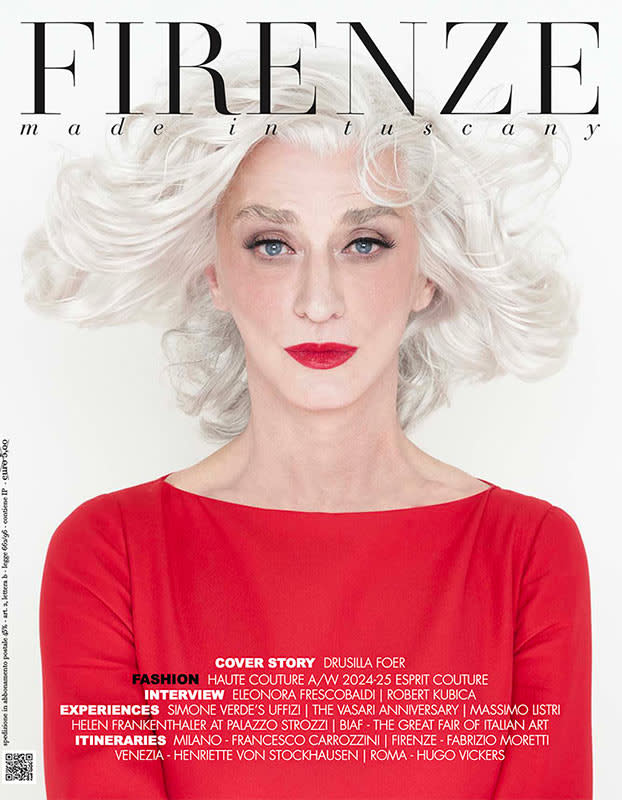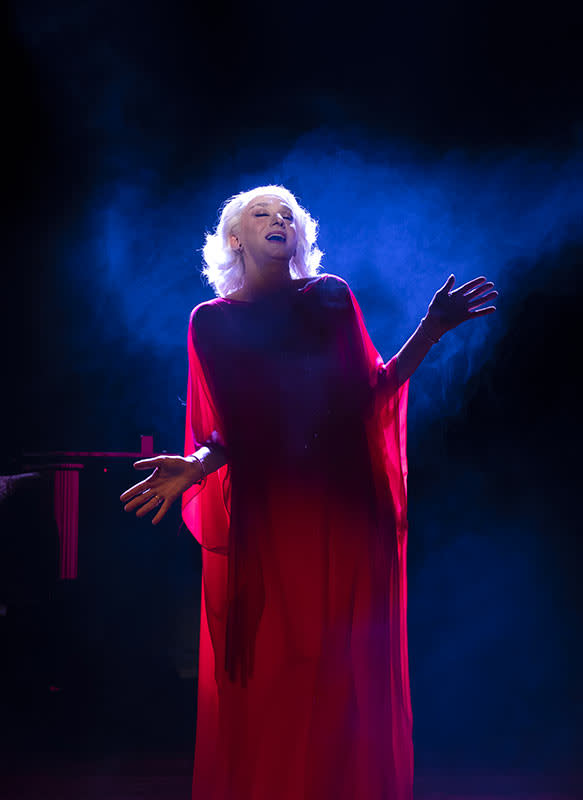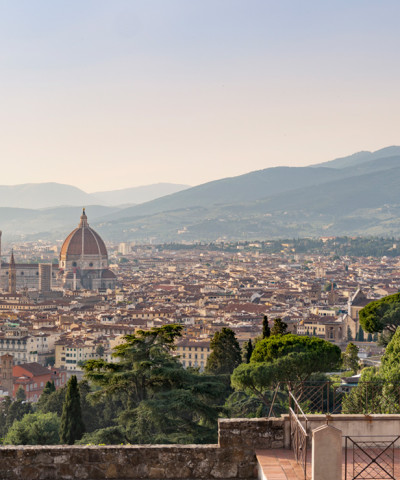Drusilla and her love for Tuscany
Our interview with the great artist who has won everyone over
She is as graceful as Marlene Dietrich, as witty as Marta Marzotto, as brilliantly snobbish as Franca Valeri. An actress, singer, writer and style icon, Drusilla Foer is a great lady, as much as she is provocative and anti-bourgeois. Tuscan-born, an age that varies from 40 to 70 years old, she lived in New York and Brussels before settling in Florence. Her artistic career began quite late. At first on YouTube, in 2011; then came television, filmmaking with Ferzan Özpetek and Roberta Torre, books, theater, music with the DRU album, fashion and, again, television with the Sanremo Festival and Almanacco. Now, after a sudden break for health reasons, she’s back on stage performing in Venere Nemica directed by Dimitri Milopulos, while the second season of Tutto chiede salvezza,in which she plays the leading role and directed by Francesco Bruni, is being released on Netflix.
 Drusilla (ph. Officine Fotografiche Firenze)
Drusilla (ph. Officine Fotografiche Firenze)Over 80 repeat performances of Venere Nemica in Italian theaters. It never happened before. Are you scared, at least a bit?
No, not scared, although it is a difficult play that needs to be ‘broken in’. It will take a lot of performances, but it’s going to be fun. And I’m happy with all these repeat performances, because I’m sure that every time it’s going to be different. This new show is a sort of emotional maze you can walk into with a smile or with bitterness, with nastiness or with lightheartedness. In short, you can perform this show over and over again without ever growing tired of it.
Have you ever got bored of performing on stage before?
Getting bored on stage? No, never. But I have to say that this show is a bit different from the previous ones. I’ve always been telling about myself, this time I’m staging a story.
What is the story of Venere Nemica?
It’s a story inspired by the fable of Cupid and Psyche by Apuleius, packed with the great themes of life, such as mortality, immortality, beauty, the end of beauty, love; there is more than enough to keep the audience entertained.
 Drusilla Foer (ph. SerenaGallorini)
Drusilla Foer (ph. SerenaGallorini)How long does it take every evening to become Venus?
I don’t put on a long wig, nor do I wear a nude-look leotard and rise out of a shell, if that’s what you mean ( she laughs). It takes about two hours between makeup and hairdo.
A lot of performances in Tuscany: you’ll be in Florence at the Puccini Theater from November 28 to December 4. What kind of relationship do you have with the Florentine audience?
It’s not an easy audience, not even if you’re one of them. Speaking of its proverbial severity, I remember when in the 1970s even stellar directors, such as Strehler, premiered with their plays starring amazing casts at the Niccolini or Pergola Theaters! The Florentine audience was feared, and it still is.
What is the best Florentine place for a goddess?
Above all, the Boboli Gardens. They were the archetype of the great European royal gardens, starting with the most important and sumptuous ones such as Versailles or the Royal Palace of Caserta. Some corners of Boboli are truly magical, where you can easily imagine a funny faun or a graceful nymph hiding behind a bush. Another perfect place for Venus is the Corsini Garden, a lovely place where my dear friend Neri Torrigiani, with Giorgiana and Sabina, invented thirty years ago a beautiful event, Artigianato&Palazzo, all about artisans and craftsmanship.
And the most elegant one?
There are many elegant places but, rather than mentioning the best-known ones, I will pick a museum I’m very fond of, the Marino Marini museum. And opposite the museum, on the street corner, is the small San Pancrazio café, which makes Florence’s best panini and chicken liver pâté crostini, with interiors that have been the same since the 1970s.
You are a great art lover and expert. Has Florence influenced this deep passion of yours someway?
Florence is a city capable of restoring art to its beauty. But beauty can appear in many ways, sometimes it doesn’t even appear, you just light up to the sight of something, to its sense of proportion and of beautiful things. Farmers’ houses in Tuscany are beautifully proportioned, not because those farmers had ever studied the basic concepts of proportion, but because they appealed to their inner sense of symmetry when building their brick houses. As for me, Florence mostly taught me wit, a pungent sense of humor and... Can I say that? Shittiness.
















